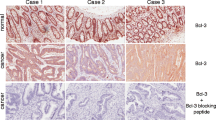Abstract
PURPOSE: Adenomatous polyposis coli protein, glycogen synthetase kinase-3-beta, T cell transcription factor/lymphoid enhancer-binding factor, and beta-catenin modulate cell differentiation and proliferation via the expression of effector genes. It has recently been postulated that betacatenin is a potent oncogene of sporadic colorectal carcinogenesis and a prognostic tumor marker. Our aim was to investigate whether the nuclear overexpression of betacatenin, possibly caused by mutations in exon 3 of betacatenin (CTNNB1), is correlated with distant metastatic spread or disease-free survival in rectal carcinoma. METHODS: Immunohistochemical analysis was performed with an anti-beta-catenin-monoclonal antibody on paraffin sections of two groups of patients (n=2 × 77) with rectal carcinoma curatively treated by surgery alone. The patients selected were all free of local disease, to exclude surgical influence. Patient groups were matched for age, gender, International Union Against Cancer stage, and year of operation (1982 to 1991) and differed only in subsequent metachronous distant metastatic spread. Follow-up was prospective (median, 9.6 years). Three staining patterns were defined: membranous (normal), diffuse cytoplasmic (pathologic), and intense nuclear staining (pathologic). When intense nuclear staining was defined, the specimen was microdissected. Then, DNA was isolated, polymerase chain reaction-amplified, and sequenced to detect mutations in exon 3. RESULTS: Nuclear overexpression of beta-catenin correlated neither with distant metastatic spread (chisquared, 0.37;P=0.79) nor with disease-free survival (log-rank with trend,P=0.62). No mutations were found in the area of the serine/threonine-kinase glycogen synthetase kinase-3-beta-phosphorylation site in exon 3 (CTNNB1) of beta-catenin. CONCLUSION: Although beta-catenin seems to play an important role in early colorectal carcinogenesis, its value as a prognostic marker is questionable. It must be assumed that metastatic ability is determined by other factors than the disturbance of the beta-catenin T cell transcription factor/lymphoid enhancer-binding factor cascade and that other mechanisms might cause the observed nuclear translocation of beta-catenin.
Similar content being viewed by others
References
Kinzler KW, Vogelstein B. Lessons from hereditary colorectal cancer. Cell 1996;87:159–70.
Korinek V, Barker N, Morin PJ,et al. Constitutive transcriptional activation by a beta-catenin-Tcf complex in APC -/- colon carcinoma. Science 1997;275:1784–7.
Morin PJ, Sparks AB, Korinek V,et al. Activation of beta-catenin-Tcf signaling in colon cancer by mutations in beta-catenin or APC. Science 1997;275:1787–90.
Peifer M. beta-catenin as oncogene: the smoking gun. Science 1997;275:1752–3.
Inomata M, Ochiai A, Akimoto S, Kitano S, Hirohashi S. Alteration of beta-catenin expression in colonic epithelial cells of familial adenomatous polyposis patients. Cancer Res 1996;56:2213–7.
Köckerling F, Reymond MA, Altendorf-Hofmann A, Hohenberger W. The influence of surgery on metachronous distant metastases and survival in rectal cancer. J Clin Oncol 1998;16:1–7.
UICC. TNM Klassifikation maligner Tumoren. 4th ed. Berlin: Springer-Verlag, 1987.
Ilyas M, Tomlinson IPM, Rowan A, Pignatelli M, Bodmer WF. Beta-catenin mutations in cell lines established from human colorectal cancers. Proc Natl Acad Sci U S A 1997;94:10330–4.
Smith KJ, Johnson KA, Bryan TM,et al. The APC gene product in normal and tumor cells. Proc Natl Acad Sci U S A 1993;90:2846–50.
Mayer K, Wolff E, Clevers H, Ballhausen WG. The human high mobility group (HMG)-box transcription factor TCF-1: novel isoforms due to alternative splicing and usage of a new exon IXA. Biochim Biophys Acta 1995;1263:169–72.
Mayer K, Hieronymus T, Castrop J, Clevers H, Ballhausen WG. Ectopic activation of lymphoid high mobility group-box transcription factor TCF-1 and overexpression in colorectal cancer cells. Int J Cancer 1997;72:625–30.
Hayes DF, Bast RC, Desch CE,et al. Tumor marker utility grading system: a framework to evaluate clinical utility of tumor markers. J Natl Cancer Inst 1996;88:1456–66.
Shimazui T, Schalken JA, Giroldi LA,et al. Prognostic Value of cadherin-associated molecules (α,beta-, and γg-Catenins and p120cas) in bladder tumors. Cancer Res 1996;56:4154–8.
Author information
Authors and Affiliations
Additional information
The first three authors contributed equally to this work. Read at the Research Forum of the meeting of The American Society of Colon and Rectal Surgeons, San Antonio, Texas, May 2 to 7, 1998.
About this article
Cite this article
Günther, K., Brabletz, T., Kraus, C. et al. Predictive value of nuclear betacatenin expression for the occurrence of distant metastases in rectal cancer. Dis Colon Rectum 41, 1256–1261 (1998). https://doi.org/10.1007/BF02258226
Issue Date:
DOI: https://doi.org/10.1007/BF02258226




